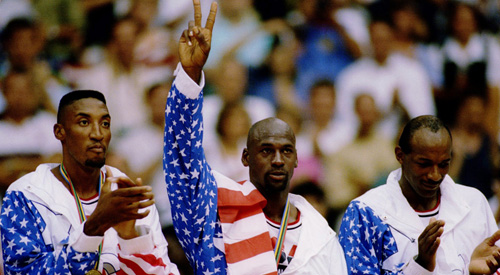
Dream Team (2012)
Rating: 8/10
Shortly before these Olympic Summer Games started, LeBron James and Kobe Bryant weighed in on the Dream Team, the men’s basketball team from the 1992 Olympics. Both said they’d like to play against that team and agreed this year’s team would win.
While professional athletes are not known for being meek in front of a microphone (indeed, their confidence is one of the reasons why they’re in the NBA), it’s hard to take that claim seriously. Indeed, both Michael Jordan and Charles Barkley laughed on hearing Bryant’s quote.
Twenty years later, the Dream Team remains maybe the most iconic basketball team ever. Never mind how much better they were than everyone else – they won every game by more than 30 points – because it was expected when the NBA’s best marched into the Olympics for the first time. What sets them apart is their cultural impact.
The 1992 Olympics was the first time most of the world saw superstars Larry Bird, Barkley, Magic Johnson and NCAA sensation Christian Laettner play. And it had a starring role for Jordan, just coming into his own as an international star at its center.
[php snippet=1]
In his new history “Dream Team,” Sports Illustrated’s Jack McCallum uncovers the deep history behind that team, from an obscure FIBA official who pushed to modernize the Olympics in the 1970s through the struggles with the college-minded USA officials over the roster to the backroom politicking over Isiah Thomas. It’s not really surprising there was more drama over who made the team than there was in any of its games.
He also cuts through the myth and legend surrounding this team. For years there were rumors about their closed-door scrimmages, featuring intense practices and Jordan repeatedly taking players to task. And there was a game against a squad of NCAA players, the only time this team lost. McCallum unwraps the stories around these: he tracked down tape copies of these games and went over them with the players, getting their insight into how these teams gelled. It’s a fascinating look at how the best international team came together.
Furthermore, he goes beyond the court, telling stories which have long only been hinted at: marathon golf matches with Jordan, high-stakes card games between the players at the hotel and – most memorably of all – Charles Barkley hitting the streets of Barcelona all night long, pressing flesh and acting as a kind of ambassador:
“On the nights I followed Barkley, there were some strange moments. An older man, speed-freak skinny and crack-pipe crazy, walked in front of him for a while, pointing and laughing like a hyena, but Barkley just kept going, sipping his cervesa and eventually outlasting him. On another occasion, a kid on a bicycle kept weaving in and out of his path until Barkley had to stare him down… On one particularly glassy-eyed evening, Barkley asked a couple of kids if her could get on their motorcycle. He gunned the engine and the bike started forward, Barkley jumping off in horror…” (pg 242)
With his long memories – McCallum covered this team for SI – and a wealth of interviews, McCallum makes this team come alive: we see the insecurities of Laettner, the dedication of Jordan and the struggles of Bird, who played these games with an ailing back that sometimes left him nearly unable to play.
“Dream Team” goes on to speak of this team’s lasting legacy. For many people, this was the first time they saw many of these players and their success inspired many around the globe: Dirk Nowitzki, Manu Ginobili and Steve Nash all watched this team in their home countries.
It goes beyond the NBA, too: by these Games’ end, Jordan was possibly the most famous athlete on the planet. His singular popularity led to some unexpected results, from a flag draped over a logo on his warm-up jacket during the medal ceremony to fans wearing his jersey in Africa.
The success of the Dream Team has led to comparisons with every other international team put together since, usually without any success: in 1994, their national team was a disaster and they underachieved in the 1996 Olympics. By 2004, the U.S. was losing games in the Olympics, as the rest of the world caught up with their level of play. It says it all when the 2008 team was called “The Redeem Team.”
With his detailed look at not only an iconic team, but at how they team impacted basketball on a global scale, McCallum’s “Dream Team” is a great read.
[php snippet=1]

